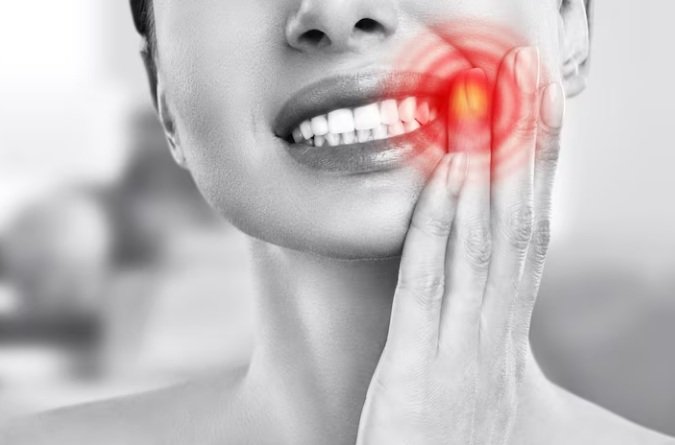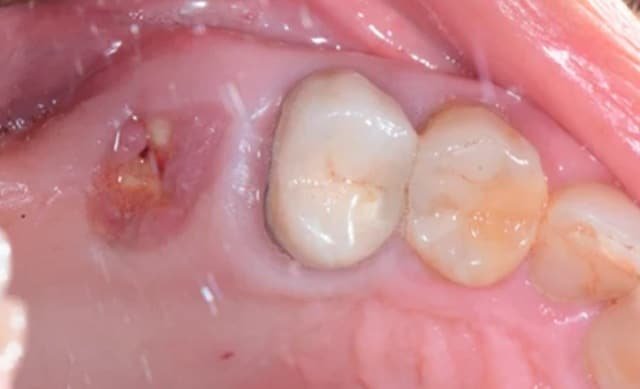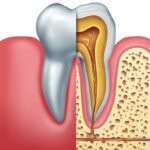Tooth pain after root canal when biting is common problem,Even though a root canal is often performed to ease tooth pain, it is possible for some discomfort to continue, especially while biting or chewing. Sometimes, the pain may be caused by transitory irritation or inflammation. However, in others, it may result from an underlying problem, such as a fractured tooth or a lingering infection.
Tooth pain after root canal when biting:
After a root canal, there are some potential causes for tooth discomfort or sensitivity while biting. Some causes include an irregular bite or a high filling, which can cause the tooth to impact harder while biting, resulting in pain.
The existence of inflammation or infection in the surrounding tissues or bone, which can produce discomfort when pressure is given to the region during biting, is another potential explanation.
If the root canal was unsuccessful in eliminating the infection, the tooth might still be pressure-sensitive. Moreover, even after a root canal, a broken or fractured tooth might produce pain while biting down.
It is crucial to arrange a follow-up consultation with your dentist if you experience tooth discomfort when biting down after a root canal to diagnose the underlying reason and obtain treatment.
Some of the most frequent causes of tooth soreness following a root canal include the following:
- Incorrect Bite:If the filling material used to cover the tooth after a root canal is too high or uneven, it might cause the tooth to impact harder while biting, resulting in pain.
- Infection or Inflammation:In certain circumstances, the root canal may not completely eliminate the disease, resulting in persistent inflammation or infection in the adjacent tissues or bone. This might create discomfort when pressure is applied while biting.
- Fractured or Cracked Tooth:If the tooth has a fracture or crack that was not evident before the root canal operation, it may still produce discomfort while biting down.
- Injury to Nerves:Occasionally, during the root canal process, the nerves in the tooth or surrounding tissues may become injured, causing pressure-induced discomfort.
- Sometimes, the tooth discomfort experienced while biting down following a root canal may not be directly connected to the treated tooth but to difficulties with the surrounding teeth, such as decay or damage.
It is vital to arrange a follow-up visit with your dentist if you experience tooth pain after a root canal to establish the underlying source and obtain the necessary therapy.
Throbbing pain 1 week after canal removal:
It is usual to have throbbing pain 1 week after root canal therapy, and there are several potential causes. Other causes include infection or inflammation that persists in the treated tooth, indicating that the root canal may not have eliminated the source of discomfort.
Another option is that the filling material used to cover the tooth after a root canal is excessively high or uneven, causing the tooth to impact harder while biting and resulting in pain. Alternately, the discomfort might be caused by a crack or fracture in the tooth that was not noticeable before the root canal treatment.
In other instances, the discomfort may be caused by transient irritation or inflammation caused by the root canal operation. This might cause soreness or sensitivity in the afflicted tooth for many days or weeks following the surgery.
However, if the pain persists or worsens over time, it is essential to consult a dentist to rule out underlying causes.
If you are feeling throbbing pain one week following root canal therapy, it is imperative that you arrange a follow-up consultation with your dentist. They will be able to evaluate the afflicted tooth and identify the root cause of the discomfort.
Depending on the cause, they may prescribe further treatment, such as more root canal treatments, modifying the filling material, or installing a crown on the tooth to offer additional support and protection.
How to stop throbbing pain root canal?
if the pain persists or worsens over time, it is essential to consult a dentist to rule out underlying causes.Some potential reasons for throbbing pain following a root canal include:
Referred pain: Pain from a neighboring tooth or other structure, such as the gums or jawbone, might be transferred to the treated tooth, resulting in excruciating pain.
Some individuals may experience an allergic response to the materials used during the root canal surgery, resulting in pain and suffering.
Infrequently, root canal surgery may cause nerve injury, resulting in pain and discomfort that may remain even after the operation.
If the tooth is not fully repaired following the root canal operation, it may get reinfected, resulting in pain and suffering.
Here are some other remedies on how to stop throbbing pain root canal:
- Use a numbing gel: Gels available over the counter can temporarily ease pain and discomfort.
- Apply the gel immediately to the afflicted region according to the instructions on the container.
- If the throbbing pain is more robust when lying down, consider elevating your head with an additional cushion or two as you sleep. This can aid in decreasing blood flow to the afflicted region and alleviating pain.
- Clove oil is a natural medicine that may alleviate pain and inflammation. Use a cotton ball saturated with clove oil straight to the afflicted region. By combining clove oil with a carrier oil, such as olive or coconut oil, you can reduce pain.
- Employ relaxation techniques: Stress and tension can increase pain, so practicing relaxation techniques such as deep breathing, meditation, or yoga may help to reduce pain and improve healing.
- Nevertheless, if the pain persists or increases despite these measures, you must visit your dentist as soon as possible to rule out any potential concerns.












